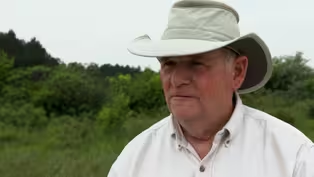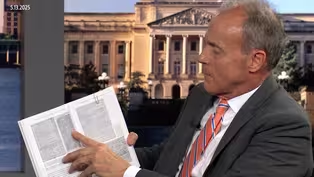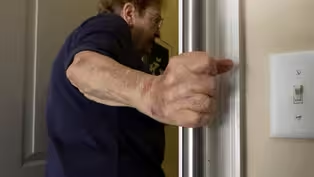
KY Engaging Adult Learners Who Want to Finish Their Degree
Clip: Season 3 Episode 259 | 3m 44sVideo has Closed Captions
More than 550,000 adult Kentuckians have college credit but no degree.
More than 550,000 adult Kentuckians have college credit but no degree. A report by Ithake S+R provides ways to engage those adult leaners. The Kentucky Council on Postsecondary Education says they hope 60% of adults in Kentucky have earned a degree by 2030.
Problems playing video? | Closed Captioning Feedback
Problems playing video? | Closed Captioning Feedback
Kentucky Edition is a local public television program presented by KET

KY Engaging Adult Learners Who Want to Finish Their Degree
Clip: Season 3 Episode 259 | 3m 44sVideo has Closed Captions
More than 550,000 adult Kentuckians have college credit but no degree. A report by Ithake S+R provides ways to engage those adult leaners. The Kentucky Council on Postsecondary Education says they hope 60% of adults in Kentucky have earned a degree by 2030.
Problems playing video? | Closed Captioning Feedback
How to Watch Kentucky Edition
Kentucky Edition is available to stream on pbs.org and the free PBS App, available on iPhone, Apple TV, Android TV, Android smartphones, Amazon Fire TV, Amazon Fire Tablet, Roku, Samsung Smart TV, and Vizio.
Providing Support for PBS.org
Learn Moreabout PBS online sponsorshipMore than 550,000 adult Kentuckians have college credit, but no degree.
And a report by a national research organization provides ways to engage those adult learners.
Officials with the Kentucky Council on Post-secondary education, or CPE, have long set a goal of having 60% of Kentucky adults earning a degree by the year 2030.
Our Kentucky Edition team shows us the efforts being made to reach that goal.
With just five years to go and half of the adult population hitting that target.
The big shift was that previously, if a student had an unpaid balance, I mean anywhere from $20 up to, you know, the average unpaid balance is around $2,500.
They were not able to get their transcripts for any courses where they had paid for that full semester.
So what this does is this allows students to reengage in education.
There's a lot that can happen in the personal lives.
And so there's many reasons why a person may need to pause their education when we have a kid.
You know, we change jobs and we have a different schedule that requires us, you know, that doesn't really fit with our academic goals.
There's also a lot of actual process barriers to entering higher education.
And so some of the recommendations in the report are really focused on having an adult learner point of contact on each of our college and university campuses.
So like an adult learner center where the staff in that center know ins and outs of what scholarships are available for adult learners, you know what the enrollment process looks like?
A brief really focuses on things like audit your holds.
We have a lot of holds, which is when a student can register or a student can't, you know, do other important things to come back to us.
Another one is to create kind of clear processes for students and clear communications.
And then another thing is there's a lot of innovative ways that campuses across the country are looking at reengaging their students that have stopped out, that may have a, a balance.
They're doing repayment program as they're doing, debt relief programs, where if a student enrolls and they complete that semester, they have $1,000 of their debt forgiven.
We're working on smoothing out the transfer process for students so that they can finish that associate's degree and move into a bachelor's degree and get it done efficiently and with a lot of affordability.
We're also focusing on gateway courses, which are those first classes that you take that are sometimes such a barrier for students to get over that they can't even get to the fun stuff.
We're working on student basic needs and mental health.
There's a lot of adults that have been working for ten, 15, 20 years.
They have incredible work experience, and our colleges and universities already have, this thing called credit for prior learning.
And that means that they could give they could award an individual like up to 60 credit hours for their previous work experience.
So really the goal is that people are able to move forward.
You know that it doesn't have to be an all or nothing kind of option, either work full time and kind of have limited growth in my career, or I stop getting any income and I go back to school full time to finish my degree.
But at the same time, they're also able to have their jobs and see what's next for them when they finish this degree or credential, what's the next step in their career ladder, and what's kind of that, earnings premium that they're going to get once they finish that degree?
According to recent research, about 20% of the people who've taken college classes but didn't graduate owed a balance and were not able to access their transcripts or their transcripts rather, before last summer.
Federal Program Working to Reforest Appalachia
Video has Closed Captions
Clip: S3 Ep259 | 3m 47s | The program focuses on strip mines. (3m 47s)
Founding Father's Role in Drafting Kentucky's Constitution
Video has Closed Captions
Clip: S3 Ep259 | 5m 54s | Author Denis Fleming used firsthand accounts to piece together Kentucky's history. (5m 54s)
KY Woman Helping Older Adults Age Safely at Home
Video has Closed Captions
Clip: S3 Ep259 | 3m 50s | The Bowling Green occupational therapist is leading the charge when it comes to aging in place. (3m 50s)
Why Medical Marijuana Isn't Yet for Sale in KY
Video has Closed Captions
Clip: S3 Ep259 | 3m 53s | Industry leaders say the product could arrive as early as this summer. (3m 53s)
Providing Support for PBS.org
Learn Moreabout PBS online sponsorship
- News and Public Affairs

Top journalists deliver compelling original analysis of the hour's headlines.

- News and Public Affairs

FRONTLINE is investigative journalism that questions, explains and changes our world.












Support for PBS provided by:
Kentucky Edition is a local public television program presented by KET



